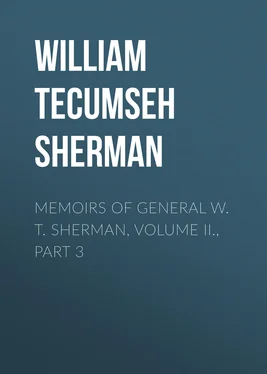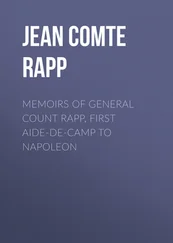William Tecumseh Sherman - Memoirs of General W. T. Sherman, Volume II., Part 3
Здесь есть возможность читать онлайн «William Tecumseh Sherman - Memoirs of General W. T. Sherman, Volume II., Part 3» — ознакомительный отрывок электронной книги совершенно бесплатно, а после прочтения отрывка купить полную версию. В некоторых случаях можно слушать аудио, скачать через торрент в формате fb2 и присутствует краткое содержание. Жанр: Биографии и Мемуары, История, foreign_edu, foreign_antique, foreign_prose, на английском языке. Описание произведения, (предисловие) а так же отзывы посетителей доступны на портале библиотеки ЛибКат.
- Название:Memoirs of General W. T. Sherman, Volume II., Part 3
- Автор:
- Жанр:
- Год:неизвестен
- ISBN:нет данных
- Рейтинг книги:3 / 5. Голосов: 1
-
Избранное:Добавить в избранное
- Отзывы:
-
Ваша оценка:
- 60
- 1
- 2
- 3
- 4
- 5
Memoirs of General W. T. Sherman, Volume II., Part 3: краткое содержание, описание и аннотация
Предлагаем к чтению аннотацию, описание, краткое содержание или предисловие (зависит от того, что написал сам автор книги «Memoirs of General W. T. Sherman, Volume II., Part 3»). Если вы не нашли необходимую информацию о книге — напишите в комментариях, мы постараемся отыскать её.
Memoirs of General W. T. Sherman, Volume II., Part 3 — читать онлайн ознакомительный отрывок
Ниже представлен текст книги, разбитый по страницам. Система сохранения места последней прочитанной страницы, позволяет с удобством читать онлайн бесплатно книгу «Memoirs of General W. T. Sherman, Volume II., Part 3», без необходимости каждый раз заново искать на чём Вы остановились. Поставьте закладку, и сможете в любой момент перейти на страницу, на которой закончили чтение.
Интервал:
Закладка:
We hastily repaired the railroad bridge at Resaca, which had been partially burned, and built a temporary floating bridge out of timber and materials found on the spot; so that Thomas got his advance corps over during the 16th, and marched as far as Calhoun, where he came into communication with McPherson's troops, which had crossed the Oostenaula at Lay's Ferry by our pontoon-bridges, previously laid. Inasmuch as the bridge at Resaca was overtaxed, Hooker's Twentieth Corps was also diverted to cross by the fords and ferries above Resaca, in the neighborhood of Echota.
On the 17th, toward evening, the head of Thomas's column, Newton's division, encountered the rear-guard of Johnston's army near Adairsville. I was near the head of column at the time, trying to get a view of the position of the enemy from an elevation in an open field. My party attracted the fire of a battery; a shell passed through the group of staff-officers and burst just beyond, which scattered us promptly. The next morning the enemy had disappeared, and our pursuit was continued to Kingston, which we reached during Sunday forenoon, the 19th.
From Resaca the railroad runs nearly due south, but at Kingston it makes junction with another railroad from Rome, and changes direction due east. At that time McPherson's head of column was about four miles to the west of Kingston, at a country place called "Woodlawn;" Schofield and Hooker were on the direct roads leading from Newtown to Casaville, diagonal to the route followed by Thomas. Thomas's head of column, which had followed the country roads alongside of the railroad, was about four miles east of Kingston, toward Cassville, when about noon I got a message from him that he had found the enemy, drawn up in line of battle, on some extensive, open ground, about half-way between Kingston and Cassville, and that appearances indicated a willingness and preparation for battle.
Hurriedly sending orders to McPherson to resume the march, to hasten forward by roads leading to the south of Kingston, so as to leave for Thomas's troops and trains the use of the main road, and to come up on his right, I rode forward rapidly, over some rough gravel hills, and about six miles from Kingston found General Thomas, with his troops deployed; but he reported that the enemy had fallen back in echelon of divisions, steadily and in superb order, into Cassville. I knew that the roads by which Generals Hooker and Schofield were approaching would lead them to a seminary near Cassville, and that it was all-important to secure the point of junction of these roads with the main road along which we were marching. Therefore I ordered General Thomas to push forward his deployed lines as rapidly as possible; and, as night was approaching, I ordered two field-batteries to close up at a gallop on some woods which lay between us and the town of Cassville. We could not see the town by reason of these woods, but a high range of hills just back of the town was visible over the tree-tops. On these hills could be seen fresh-made parapets, and the movements of men, against whom I directed the artillery to fire at long range. The stout resistance made by the enemy along our whole front of a couple of miles indicated a purpose to fight at Cassville; and, as the night was closing in, General Thomas and I were together, along with our skirmish-lines near the seminary, on the edge of the town, where musket-bullets from the enemy were cutting the leaves of the trees pretty thickly about us. Either Thomas or I remarked that that was not the place for the two senior officers of a great army, and we personally went back to the battery, where we passed the night on the ground. During the night I had reports from McPherson, Hooker, and Schofield. The former was about five miles to my right rear, near the "nitre-caves;" Schofield was about six miles north, and Hooker between us, within two miles. All were ordered to close down on Cassville at daylight, and to attack the enemy wherever found. Skirmishing was kept up all night, but when day broke the next morning, May 20th, the enemy was gone, and our cavalry was sent in pursuit. These reported him beyond the Etowah River. We were then well in advance of our railroad-trains, on which we depended for supplies; so I determined to pause a few days to repair the railroad, which had been damaged but little, except at the bridge at Resaca, and then to go on.
Nearly all the people of the country seemed to have fled with Johnston's army; yet some few families remained, and from one of them I procured the copy of an order which Johnston had made at Adairsville, in which he recited that he had retreated as far as strategy required, and that his army must be prepared for battle at Cassville. The newspapers of the South, many of which we found, were also loud in denunciation of Johnston's falling back before us without a serious battle, simply resisting by his skirmish-lines and by his rear-guard. But his friends proclaimed that it was all strategic; that he was deliberately drawing us farther and farther into the meshes, farther and farther away from our base of supplies, and that in due season he would not only halt for battle, but assume the bold offensive. Of course it was to my interest to bring him to battle as soon as possible, when our numerical superiority was at the greatest; for he was picking up his detachments as he fell back, whereas I was compelled to make similar and stronger detachments to repair the railroads as we advanced, and to guard them. I found at Cassville many evidences of preparation for a grand battle, among them a long line of fresh intrenchments on the hill beyond the town, extending nearly three miles to the south, embracing the railroad-crossing. I was also convinced that the whole of Polk's corps had joined Johnston from Mississippi, and that he had in hand three full corps, viz., Hood's, Polk's, and Hardee's, numbering about sixty thousand men, and could not then imagine why he had declined battle, and did not learn the real reason till after the war was over, and then from General Johnston himself.
In the autumn of 1865, when in command of the Military Division of the Missouri, I went from St. Louis to Little Rock, Arkansas, and afterward to Memphis. Taking a steamer for Cairo, I found as fellow-passengers Generals Johnston and Frank Blair. We were, of course, on the most friendly terms, and on our way up we talked over our battles again, played cards, and questioned each other as to particular parts of our mutual conduct in the game of war. I told Johnston that I had seen his order of preparation, in the nature of an address to his army, announcing his purpose to retreat no more, but to accept battle at Cassville. He answered that such was his purpose; that he had left Hardee's corps in the open fields to check Thomas, and gain time for his formation on the ridge, just behind Cassville; and it was this corps which General Thomas had seen deployed, and whose handsome movement in retreat he had reported in such complimentary terms. Johnston described how he had placed Hood's corps on the right, Polk's in the centre, and Hardee's on the left. He said he had ridden over the ground, given to each corps commander his position, and orders to throw up parapets during the night; that he was with Hardee on his extreme left as the night closed in, and as Hardee's troops fell back to the position assigned them for the intended battle of the next day; and that, after giving Hardee some general instructions, he and his staff rode back to Cassville. As he entered the town, or village, he met Generals Hood and Polk. Hood inquired of him if he had had any thing to eat, and he said no, that he was both hungry and tired, when Hood invited him to go and share a supper which had been prepared for him at a house close by. At the supper they discussed the chances of the impending battle, when Hood spoke of the ground assigned him as being enfiladed by our (Union) artillery, which Johnston disputed, when General Polk chimed in with the remark that General Hood was right; that the cannon-shots fired by us at nightfall had enfiladed their general line of battle, and that for this reason he feared they could not hold their men. General Johnston was surprised at this, for he understood General Hood to be one of those who professed to criticise his strategy, contending that, instead of retreating, he should have risked a battle. General Johnston said he was provoked, accused them of having been in conference, with being beaten before battle, and added that he was unwilling to engage in a critical battle with an army so superior to his own in numbers, with two of his three corps commanders dissatisfied with the ground and positions assigned them. He then and there made up his mind to retreat still farther south, to put the Etowah River and the Allatoona range between us; and he at once gave orders to resume the retrograde movement.
Читать дальшеИнтервал:
Закладка:
Похожие книги на «Memoirs of General W. T. Sherman, Volume II., Part 3»
Представляем Вашему вниманию похожие книги на «Memoirs of General W. T. Sherman, Volume II., Part 3» списком для выбора. Мы отобрали схожую по названию и смыслу литературу в надежде предоставить читателям больше вариантов отыскать новые, интересные, ещё непрочитанные произведения.
Обсуждение, отзывы о книге «Memoirs of General W. T. Sherman, Volume II., Part 3» и просто собственные мнения читателей. Оставьте ваши комментарии, напишите, что Вы думаете о произведении, его смысле или главных героях. Укажите что конкретно понравилось, а что нет, и почему Вы так считаете.












